Can Talisay cops cook up a ‘miracle’ to turn Tangke into a drug-free barangay?
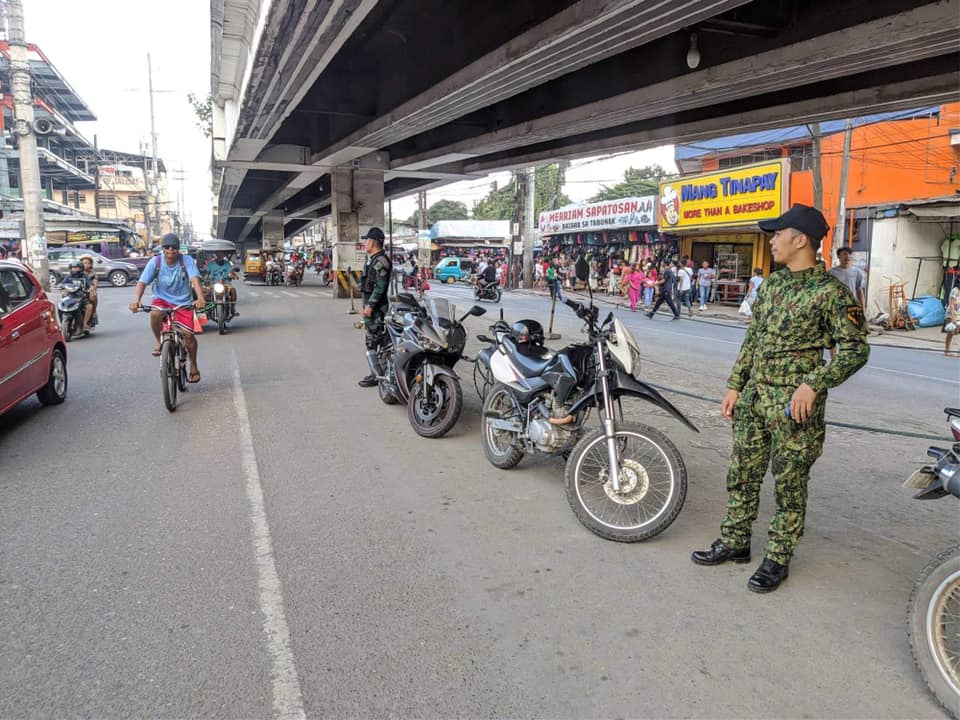
More police are seen on the roads in Talisay City as part of the program to clear the barangays from illegal drugs. | Photo Courtesy of Talisay City Police
CEBU CITY, Philippines — There’s a saying that most old persons in Barangay Tangke in Talisay City in southern Cebu know quite too well: “The haven for notorious criminals especially those involved in illegal drugs is not in hell but in Tangke.”
The reputation of this infamous barangay as being a hotspot in southern Cebu for the illegal drug trade is no secret to the residents as well as Talisay City’s neighboring towns in Cebu.
President Rodrigo Duterte even mentioned the barangay a couple of times since he had launched his campaign against illegal drugs in 2016.
Those, who grew up in the area and had not succumbed to the illegal drug activities in the barangay, told CDN Digital that as early as 7 p.m. they would already stay indoors, close their windows, double-lock their doors and pray that the night would be peaceful.
It was their reality for so many years — a reality that saw no end in sight for the residents.
But then at the start of 2020, they were welcomed by what some residents call a “miracle.”
The elders or senior citizens in the area thought they would never see the day when they would get to walk on the streets of the barangay at night without fearing for their lives.
But in a month’s time this year, this belief changed after the Talisay City Police implemented several anti-illegal drug operations and measures to stop the illegal drug trade in the barangay.
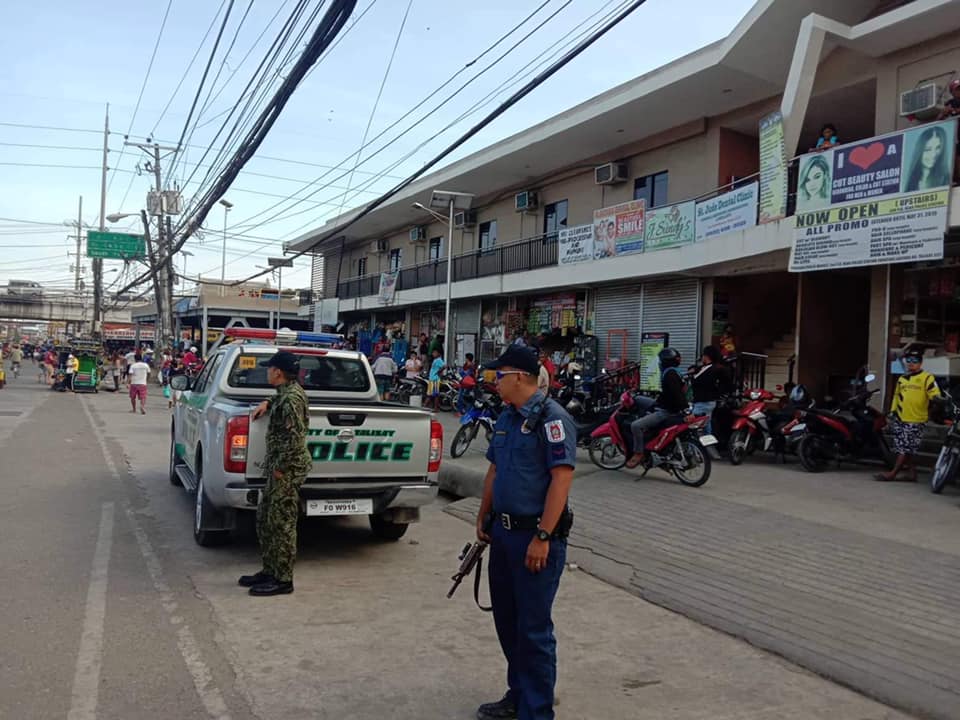
Policemen in Talisay City conduct checkpoints in areas near Barangay Tangke as seen in this February 2, 2020 photo. | Photo courtesy of the Talisay City Police Station.
“Police lockdown”
These included what the Police Major Gerard Ace Pelare calls a “police lockdown” of the barangay.
The “lockdown” involved 24-hour police patrols in the barangay’s streets and random checkpoints in the entrance and exit points of the area.
More policemen were also visible in the streets of the barangay to conduct house to house visitations and this was coupled with their intensified buy-bust operations of confirmed individuals involved with illegal drugs,
In less than a month’s time, Pelare said they noticed a decrease of the drug supply in Barangay Tangke by at least 70 percent.
He said the reason the barangay had a huge supply of illegal drugs was because of the rich illegal drugs market, where even those from other towns would visit the barangay to buy drugs there.
These spurred the illegal drug traders to continue to store more illegal drugs in the area.
This was one of the focus areas that Pelare wanted to address — the main cause of the proliferation of illegal drugs in the barangay. And so the “lockdown” was implemented starting January 24, 2020.
The lockdown involves more policemen setting up checkpoints in the entry and exit points of the barangay and the implementation of the ordinance banning the entry of persons not from the area from 10 p.m. to 4 a.m.
“Ang nahitabo man gud diha kay kung magcheckpoint ka, automatic di na kasulod ang mga mamalitay, unya ang Tangke ug San Roque sa una nidaghan na sila (illegal drug traders) tungod sa market sa mamalitay,” said Pelare.
(What happened was that with the checkpoints the buyers of illegal drugs could automatically not enter the area. In previous years, drug traders in Barangays Tangke and San Roque prospered because of the market of illegal drugs in these areas.)
Pelare said with the lockdown it was but natural to see a significant drop of the illegal drug supply in the area as the police were able to limit the illegal drug peddlers’ chances of trading.
He said this was what they noticed that their recent buy-bust operations that the suspects arrested for illegal drugs were no longer from Barangay Tangke.
For Pelare, this would only mean one thing: Their strict implementation of the law in Barangay Tangke had proved effective.
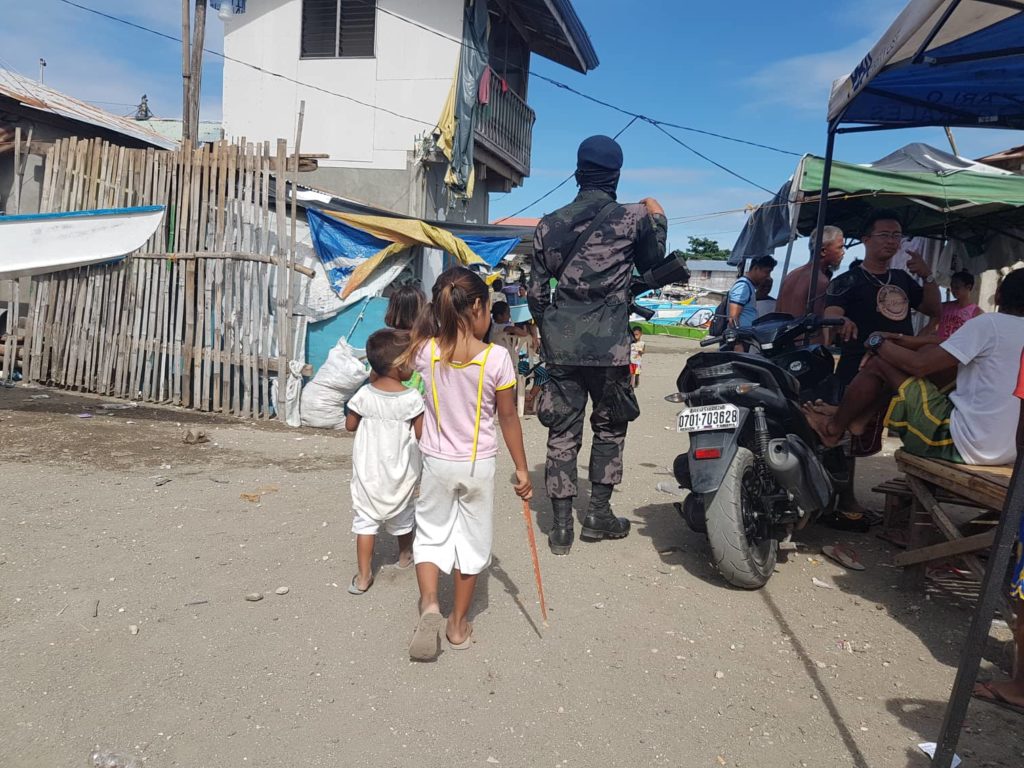
Policemen do their random house to house visitations in Barangay Tangke, Talisay City on Sunday, February 16, 2020. | Alven Marie Timtim
Read more: Talisay cops launch campaign to win over Tangke community’s hearts
Winning over community’s hearts and minds
But before they implemented the lockdown of the barangay, he said that they first did projects aimed at winning over the hearts and minds of the residents of the community.
These included feeding programs, medical missions and coastal cleanup drives in the barangays.
So when the time came for them to implement the strict implementation of the law, the community gave no resistance to the changes.
He claimed that the community even opened up to them because they said that they were tired of fearing strangers that settled in their area.
Pelare said that the residents grew tired also of suffering from the negative effects of the things these strangers did that helped gave the barangay the drug haven notoriety that it was known for.
These negative effects included some residents having their job applications rejected for simply being a resident of the barangay.
“Not all people in Tangke are involved with illegal activities. There are more good citizens (there),” said Pelare.
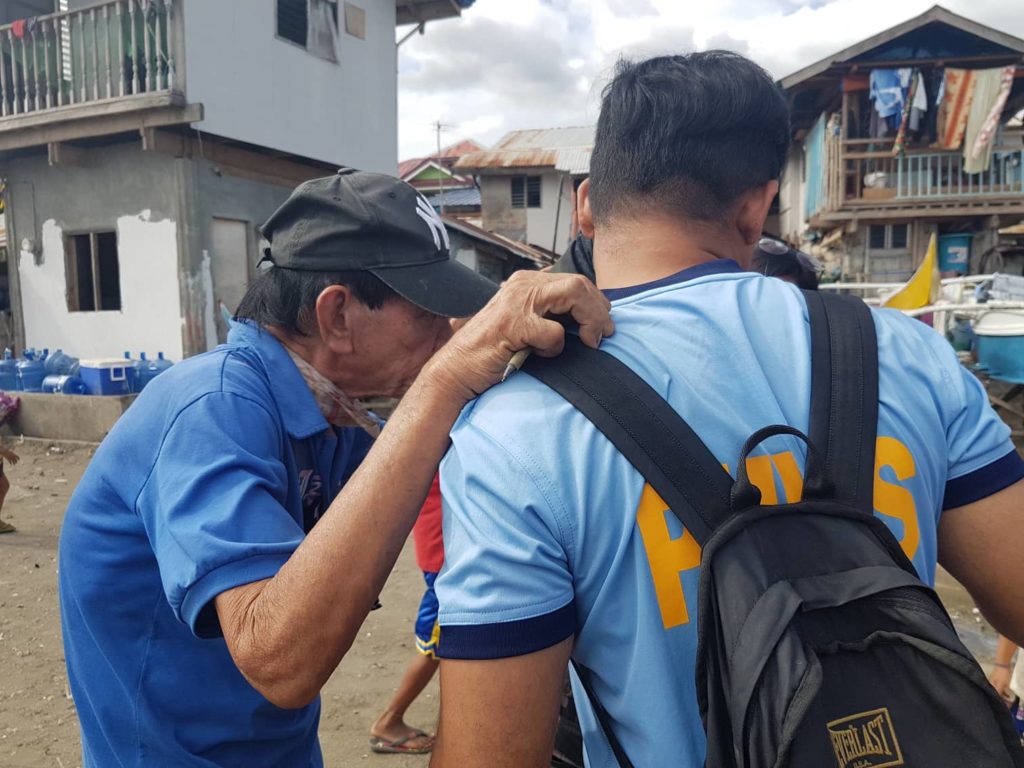
A policeman talks with an elderly resident of Barangay Tangke, Talisay City. | Alven Marie Timtim
After the 24-hour checkpoints were implemented and police set a weekly and random house to house visitation in the barangay, Pelare said they also implemented more community-based programs.
Some of these programs were done with the help of the Talisay City government such as the house to house visitations where it was not only to record the original residents there but also to educate the residents about community-based activities the police were doing to help make the situation better for the residents.
The house visitations provided the police and the city government the opportunity to be closer to the public.
These also gave them the opportunity to hear story of the Tangke residents and to encourage these residents to contribute to the authorities’ cause by giving them the necessary information to stop the illegal drug trade in their barangay.
Pelare said that since implementing their community-related programs there, they had been a marked improvement in how the residents look at the policemen in the barangay.
He was referring to instances in the past when residents would run back inside their houses when they would see policemen.
A thing that they had to do to protect themselves from possible retributions from criminals in the area for just talking to policemen.
“Now, the residents are the ones who would give the police tips of suspected persons who are visiting their area,” said Pelare.
Normal lives for the residents
Fisherman Jose Gaviola, 61, a resident for about 40 years in Sitio Rattan, a coastal residential area in Barangay Tangke, said the “cleansing program” of the police and government had helped them sleep peacefully at night.
“Nalipay gyud mi nga naa na sila diri kay wala nagyuy siaw-siaw mo ngari diri (We are happy that they [police] are here because we noticed that there are no longer those suspicious persons, who would create trouble in the barangay),” said Gaviola.
He said that they had joined the programs that the police had implemented to prove that they had not been involved with any illegal activity in the barangay.
He said that some residents would even try to subtly ask suspected criminals to leave the barangay and return to their hometowns.
But Gaviola and these residents, of course, are among the lucky ones, who were not hurt or killed for giving such an advice to these persons.
For 68-year-old Teresita Abarquez, 68, a retired barangay worker, had dreamed of peaceful streets in the barangay where one would not fear being possibly killed at 9 p.m. for just walking on the streets at that time.
Abarquez said that for such a long time, when the sun would set, that would be the time for them to stay indoors as a precautionary measure to avoid being a victim of violence in the barangay.
“Mahadlok gyud mi kay kusog man ang patay diri (We were afraid to go out after sundown as the killings here had been rampant),” said Abarquez.
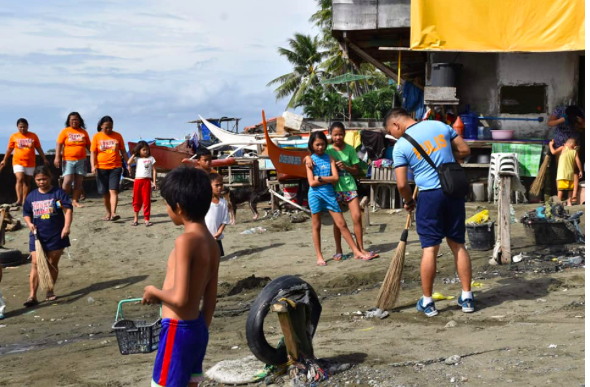
A Talisay City policeman helps clean Barangay Tangke in one of their coastal cleanup activities in the barangay. | Photo from Talisay City FB
Hopes and plans
Pelare said he was optimistic of achieving his goal to clear the barangay of illegal drugs in three months and that would be with the help and cooperation of the community.
He said for now they were focusing on Tangke as it had been a hotspot for the illegal drug trade in the city.
He said he hoped that after achieving their goal in Tangke, he intended to clear other drug-infested barangays in the city.
“We just need to maintain (our programs to address illegal drugs in the city),” said Pelare.
He said that they planned to continue to implement more community-related programs such as the feeding program and coastal cleanups and make these as part of the total package to help the community to not fall victim to illegal activities.
Pelare said that if the whole community would be helping each other with the current problem, then there would be no doubt that the whole Talisay City would be a safer place more than ever to live in./dbs
Disclaimer: The comments uploaded on this site do not necessarily represent or reflect the views of management and owner of Cebudailynews. We reserve the right to exclude comments that we deem to be inconsistent with our editorial standards.
